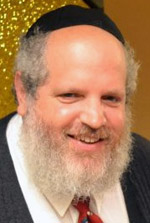Parshat Shmini

CARLSBAD, California — As the name of the portion indicates this week’s Torah reading begins on the eighth day of the process of inaugurating the Mishkan / The Tabernacle. For a full week Moses had assembled and disassembled the mobile sanctuary as well as modeling the services that would be done within it. At the end of that week, his brother, Aharon HaKohen / Aaron the High Priest, took over the duties for which he had been designated.
The aspirations of the people had come to fruition. They built the Mishkan to bring atonement after the sin of the Golden Calf drove the Divine Presence / The Shechinah from their midst. The people stood together in awe as they saw, with their eyes of flesh and blood, as the Shechinah inhabited its new ‘home.’ The people realized that their Teshuva, their heartfelt return to G-d after their sin, had been accepted. The home that they had sacrificed for and had been painstakingly built by their hands came to be inhabited by the Creator.
This should have been the very apex of Jewish happiness for all times! Yet, it was not to be.
Aharon’s two oldest sons, Nadav and Avihu, brought an (unsanctioned) incense offering, and were consumed by the Almighty. Tragedy struck at what should have been the happiest of times! Why?! What was so horrible about bringing even an uncalled for incense offering? Doesn’t G-d want us to sacrifice to Him? Isn’t the incense offering one of G-d’s ‘favorites’?
Numerous commentaries grapple with this question. Part of the answer can be deduced by other laws that are juxtaposed with this incident. We are told that a priest may not do the divine service when he is under the influence of alcohol. We also learn that Nadav and Avihu were bachelors.
What does this have to do with that? In short; everything!
When one imbibes alcohol he/she feels high and the cares and worries of this world seem to dissipate as the mind is quieted from its typical state of being. The drinker feels a sense of removal, a euphoric release from the normal pressures of the ‘rat race’ and instead feels unnaturally happy as his inhibitions drift away.
Speaking of the normal pressures of the world, those of us blessed with children understand how the pressures of the world are magnified with the onset of parenthood when one must find a way to support a growing family.
We see that Nadav and Avihu sought to get away from the mundane physical world; they drank and they remained single so that they could cleave to G-d without any ‘impediments’ or ‘distractions’. Doesn’t that sound beautiful?
Well, it would be except for one issue. That is NOT what G-d wants for His children. If G-d wanted us to be in a state of spiritual ecstasy there would have been no need to create a physical world and send our souls into physical bodies. G-d could have just allowed our souls to bask in His Divine Radiance in the Heavenly Realm, where no evil, which of course is a covering of G-dliness, exists. But that was not, and is not, the Divine Plan. Instead, the plan is for imperfect human beings to grapple with the mundane physical world, and through our blood, sweat, and tears to transform it into a fitting dwelling place for the King of kings. The purpose of Creation is to be found in our effort at overcoming that which conceals the spiritual.
And so the extraordinarily righteous brothers paid the ultimate price for their desire to cleave to G-d.
The lesson for us is very important. We should feel the desire to connect to the Source of everything. In order to actuate that connection it is critical that we do so in the way mandated by our Commander in Chief. G-d has told us how He wishes to be served. That is why the Torah is so very important. It is possible that we may not understand how or why every Mitzvah / Divine Commandment was made or its purpose, but that is not the issue. Our job is to fulfill the commandments. That is not to say that we shouldn’t try to understand the Mitzvot. In fact, the opposite is true. We should work very hard at trying to understand. But we must realize that first we fulfill the commandments even if we do not understand them.
This approach is called Kabbalat Ohl Malchut Shamayim / Accepting the Yoke of Heaven. Interestingly we are told that when we approach our Divine Service in this manner, our understanding of the commandments will necessarily be enhanced.
May G-d grant us all a deep understanding and appreciation of the Mitzvot and may we do them with joy and selflessness!
*
Rabbi Yeruchem Eilfort is Director of Coastal Chabads and Chabad at La Costa. Rabbi Eilfort welcomes readers’ comments and questions and may be reached at RabbiE@ChabadatLaCosta.com.